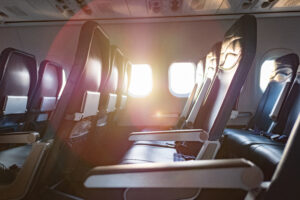While non-essential travel is strongly discouraged due to COVID-19, airlines are still operating for those needing to fly home to be with family or travel for work. But exactly how safe are planes right now? Here’s a breakdown of the safety measures being implemented at airports and on planes.
Daily Flights and Travelers are Down by More Than 50 Percent
Coming into close contact with numerous people is the primary concern when traveling during the coronavirus crisis. Fortunately, domestic and international travel is at an all-time low. The TSA has been posting daily checkpoint numbers comparing the total travelers this year with those in 2019, and it’s currently at around just five percent of what it was then. While numbers were similar in early March, that quickly started to plummet, reaching under 200,000 daily travelers by March 27, compared to 2.5 million last year. Since April 6, the total number of travelers hasn’t reached over 109,000.
Planes aren’t coming into contact with as many destinations either, as airlines have canceled flights as a result of the massive reduction in demand. Delta reportedly canceled 80 percent of its flights in April, while American Airlines also said they would be suspending 60 to 70 percent of domestic flights and 80 to 90 percent of international flights in April, with those numbers increasing or staying the same in May. United Airlines dropped from 157 total daily flights at Newark Liberty International Airport and LaGuardia Airport to just 17 flights per day. Globally, the number of scheduled flights is currently down by 64 percent from last year, according to OAG.com.
TSA Has Implemented New Screening Practices
Gone are the days of being packed like sardines in long TSA security lines. Most travelers have reported there being few other travelers as they make their way through security, which isn’t surprising given that a typically busy airport like San Francisco International is now seeing roughly 4,000 travelers per day versus its typical average of 150,000 passengers.
The TSA website also outlines the safety measures its enforced to help prevent the spread of the virus. Visual cues of appropriate social-distancing spacing are put on checkpoint floors, and the TSA has staggered the use of lanes where possible. Frontline employees are reportedly routinely cleaning and disinfecting frequently touched surfaces and screening equipment, plus using a fresh pair of gloves upon passenger’s request. Travelers are also allowed to wear masks during security screenings, though a TSA officer may ask the traveler to adjust the mask when visually confirming their identity.
Airport Restaurants and Lounges are Closed or Only Providing Take-Out
Similar to cities across the world, many retailers and dining options at airports have closed, decreasing the opportunity for interaction with others. Take JFK Airport in New York City for example, which is only allowing for take-out and grab-and-go concessions. Though the food courts (but not all outlets) remain open, travelers are required to maintain at least six feet of distance from others.
Airlines have also temporarily closed or reduced operating hours for their premium clubs and lounges. American Airlines has closed flagship Lounges in Chicago (ORD), Dallas-Fort Worth (DFW), Los Angeles (LAX), and Miami (MIA). United has closed all of its Polaris Lounges, as well as a majority of its United Clubs.
Planes are Undergoing Extensive Cleaning
Airlines have increased their cleaning protocols significantly. Delta is leading the charge, as the company added a fogging process to disinfect trans-oceanic aircraft interiors. The process is done with tray tables lowered and overhead bins and lavatory doors open. Southwest, American, United, and JetBlue airlines have also reported increasing the amount of cleaning. United Airlines states that when they’re notified by the CDC of an employee or customer who has traveled onboard and is potentially exhibiting coronavirus symptoms, the impacted aircraft is taken out of service and sent through a full decontamination process.
The Boarding Process and On-Flight Experience Promote Social Distancing
Travelers are encouraged to use mobile boarding to prevent touchpoints, and many airport locations either require or strongly advise everyone to wear face masks. JetBlue employees are required to have a face covering if they cannot maintain adequate social distance.
As of April 10, Delta started boarding all of its flights from the rear, row by row, to reduce the number of people passing each other. The airline has also said it would reduce the number of passengers per flight and block middle seats when possible.
On board, many airlines have stripped away food and beverage cart service, instead simply doling out baggies with water and snacks in Delta’s case, or having a single snack offering and water for JetBlue passengers. Southwest has temporarily suspended all onboard beverage and snack service until further notice. Note that many airlines are continuing meal and alcohol purchase service for upgraded seats, though glassware has been replaced with single-use cups and options are limited.
Non-essential reading materials like in-flight magazines have been removed, and crew members have been provided with sanitizer. Furthermore, all Southwest, JetBlue, and Delta planes, plus most United and American Airlines planes, are outfitted with HEPA (High-Efficiency Particulate Air) air filters, which provide a complete air change on average every three minutes. The filters extract more than 99 percent of viruses.
While there’s no guarantee that these measures will prevent travelers from being exposed to COVID-19, it’s clear that planes and airports are following extensive cleaning and safety practices to lessen that chance.
Stay on top of breaking sales, fare drops, and more! Follow us on Twitter @Airfarewatchdog. And make sure to sign up for FREE airfare alerts to be notified when prices drop
Laura Hinely / Shutterstock






